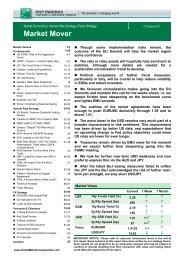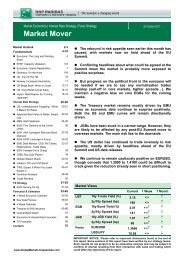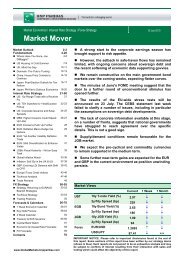Market Economics | Interest Rate Strategy - BNP PARIBAS ...
Market Economics | Interest Rate Strategy - BNP PARIBAS ...
Market Economics | Interest Rate Strategy - BNP PARIBAS ...
You also want an ePaper? Increase the reach of your titles
YUMPU automatically turns print PDFs into web optimized ePapers that Google loves.
The latest developments increase the probability of<br />
the opposite outcome: i.e. that the refinancing rate<br />
could be raised before the tender procedures have<br />
been returned to 'normal': i.e. before competitive<br />
bidding is implemented across all operations.<br />
4.5<br />
4.0<br />
3.5<br />
Chart 1: Cost Pressures Contained<br />
Hourly Labour Costs (% y/y)<br />
To be fair, the ECB has kept its options very much<br />
open throughout the debate about its exit from policy<br />
stimulus and Mr Trichet was very explicit in the press<br />
conference that either order was possible.<br />
Running late<br />
Our own forecast has been for the ECB to deliver its<br />
conventional tightening 'late': i.e. the first increase in<br />
the refinancing rate would be delivered only in Q2<br />
2012. This forecast has been predicated primarily on<br />
low core inflation at the eurozone aggregate level,<br />
solid but unspectacular eurozone growth given<br />
substantial fiscal headwinds in some member states<br />
and unusually low money and bank lending growth<br />
rates. Ongoing market turbulence and uncertainty<br />
over the outlook for sovereign debt markets has also<br />
been a key element of our forecast of the tightening<br />
cycle beginning next year not this.<br />
Nonetheless, we have highlighted that pay trends in<br />
the core of the eurozone, in Germany especially,<br />
were likely to be a source of concern for the ECB this<br />
year. As such, while we did not forecast that the ECB<br />
would actually be hiking rates in 2011, we expected<br />
the debate in the market (and on the ECB Governing<br />
Council) to be in the direction of ‘early’ tightening.<br />
This debate is obviously up and running now and if<br />
our expectation of macroeconomic developments in<br />
the next few months – an acceleration in ‘hard’<br />
activity data to follow the buoyant sentiment surveys,<br />
and above-target inflation - is borne out, the market<br />
will continue to price in an increasing probability of<br />
rate hikes this year.<br />
Progress at the finance ministers meeting at the start<br />
of next week towards expanding and/or evolving the<br />
EFSF would further reinforce that trend as it would<br />
reduce the likelihood of another bout of extreme<br />
stress in sovereign markets, removing one potential<br />
obstacle to future ECB tightening.<br />
Inflation developments<br />
Whether the ECB's bark will ultimately prove to be<br />
worse than its bite will depend on a range of factors.<br />
But the key issue, on the basis of what we heard<br />
from the press conference, is whether the elevation<br />
of headline inflation continues and leads to higher<br />
inflation expectations and/or 'second round' effects<br />
on wages which drive core inflation higher. Wage<br />
trends remain low by past standards (Chart 1). But<br />
surveys of household price perceptions have been<br />
shifting upwards (Chart 2).<br />
3.0<br />
2.5<br />
2.0<br />
1.5<br />
1.0<br />
0.5<br />
Negotiated Wages (% y/y)<br />
Compensation per Employee (% y/y)<br />
97 98 99 00 01 02 03 04 05 06 07 08 09 10<br />
Source: Reuters EcoWin Pro<br />
80<br />
70<br />
60<br />
50<br />
40<br />
30<br />
20<br />
10<br />
0<br />
-10<br />
-20<br />
Chart 2: Price Perceptions Increasing<br />
EC Consumer Survey:<br />
Price Trends<br />
86 88 90 92 94 96 98 00 02 04 06 08 10<br />
Source: Reuters EcoWin Pro<br />
Past 12 Months<br />
Next 12 Months<br />
Our expectation is that a combination of favourable<br />
base effects and a moderation in oil prices will lead<br />
to a deceleration in headline inflation from March<br />
onwards, with the rate going back below 2% from<br />
April. The anxiety at the ECB over inflation should<br />
recede if so. We also expect the fiscal difficulties in<br />
the eurozone to remain a problem for some time yet<br />
and an intensification of volatility in markets could<br />
quickly move the focus of the ECB’s agenda away<br />
from policy tightening.<br />
Bottom line<br />
The ECB has given the market, and forecasters, a<br />
wake up call, highlighting its increasing unease over<br />
inflation and making it clear that higher interest rates<br />
will be delivered if prospects continue to deteriorate.<br />
The chances of the conventional exit being delivered<br />
earlier than the unconventional exit have also risen.<br />
While our own forecast remains for a ‘late’ tightening,<br />
the risk of earlier hikes has clearly risen. The signals<br />
from the ECB also reinforce our view that it will hike<br />
before the Fed does. As relatively little in the way of<br />
rate hikes has been priced in for this year, the market<br />
is likely to continue to shift in the direction of early<br />
tightening absent a resurgence in market volatility.<br />
Ken Wattret 13 January 2010<br />
<strong>Market</strong> Mover<br />
8<br />
www.Global<strong>Market</strong>s.bnpparibas.com

















